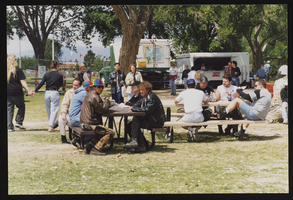Search the Special Collections and Archives Portal
Search Results
Ed May oral history interview
Identifier
Abstract
Oral history interview with Ed W. May conducted by Claytee D. White on July 22, 2010 for the Boyer Early Las Vegas Oral History Project. In this interview, May discusses golfing in Las Vegas, Nevada and the Valley View Club, an organization for predominately African American golfers, and its significance to the African American community. May describes how the club began and recalls anecdotes from his time as president of the club for nine years.
Archival Collection
Cindy Baca oral history interview
Identifier
Abstract
Oral history interview with Cindy Baca conducted by Barbara Tabach on May 22, 2019 for the Remembering 1 October Oral History Project.
Cindy Baca, born and raised in Las Vegas, talks about her family and occupation as a librarian at Escobedo Middle School. Cindy's twin daughters were present and injured during the Route 91 Festival and October 1 shooting. She describes their experiences and the Random Acts of Kindness project she piloted at her school after the incident.
Archival Collection
Carratelli Family Collection on Gay Rights in Nevada
Identifier
Abstract
The Carratelli Family Collection on Gay Rights in Nevada (1992-2002) consists of documents and ephemera from various gay rights organizations and events in Las Vegas, Nevada. In addition to documents, fliers, and meeting minutes, the collection houses a box of t-shirts from various gay events and campaigns. The collection is especially focused on issues of Gay Pride organizing.
Archival Collection
Robert H. Barrett oral history interview
Identifier
Abstract
Oral history interview with Robert H. Barrett conducted by Robert B. Grzywacz on February 22, 1975 for the Ralph Roske Oral History Project on Early Las Vegas. Barrett discusses the history of early Las Vegas, Nevada in terms of prostitution, education, Carole Lombard's plane crash, and atomic testing at Yucca Flats, Nevada.
Archival Collection
Ruth Poirier oral history interview
Identifier
Abstract
Oral history interview with Ruth Poirier conducted by Joanne Goodwin on February 05, 2003 for the Women's Research Institute of Nevada (WRIN) Las Vegas Women Oral History Project. Poirier opens her interview by discussing her partner Doris Pressler, who had passed away before the interview. She describes Doris' upbringing, her role in the first band at the Roseland Ballroom in New York, and explains how an all-women band in the 1930s and 1940s was a phenomenon. Poirier then discusses her own history, including how she became involved in music and all-women bands, and how she met Doris. Poirier describes in detail the importance of music to her family, the types of music she played, and what it was like to be a musician during the Depression. She talks about her relationship with Doris and recalls early interactions with other gay youths. Poirer ends her interview explaining why she and Doris decided to settle in Las Vegas, Nevada, and describes their impressions and involvement with the local LGBTQ+ community.
Archival Collection
Monroe Williams oral history interview
Identifier
Abstract
Oral history interview with Monroe Williams conducted by Claytee D. White on August 15, 2000 and August 22, 2000 for the Boyer Early Las Vegas Oral History Project. In this interview Monroe Williams discusses moving to Las Vegas, Nevada in 1943, living in the historical Westside neighborhood, and being one of the first black fire fighters in Las Vegas. He also talks about being involved with the National Association for the Advancement of Colored Peoples (NAACP), being in the Navy for two years, and his real estate and property management companies.
Archival Collection
Las Vegas, Nevada Anti-Gay Counter-Protest Collection
Identifier
Abstract
The Las Vegas, Nevada Anti-Gay Counter-Protest Collection (2001) documents the counter-protests against supporters of Reverend Fred Phelps of the Westboro Baptist Church at their anti-homosexual demonstrations. The counter-protests were held at the University of Nevada, Las Vegas campus and the Liberace Museum on March 10, 2001. Materials in this collection included a typed excerpt from the journal of Dennis McBride recounting his experiences on the day of the protest. Also included are photographic prints of counter-protestor Joshua Dart at the demonstration, a poster from the demonstration, correspondence between McBride and Dart, and an issue of the
Archival Collection

People at Gay Pride: photographic print
Date
Archival Collection
Description
Gay Pride 1998 at Sunset Park. Photographer: Dennis McBride. (4-25-98)
Image
Brenda Mason oral history interview
Identifier
Abstract
Oral history interview with Brenda Mason conducted by Claytee D. White on December 20, 2006 and December 22, 2006 for the UNLV @ 50 Oral History Project. Mason discusses attending the University of Nevada, Las Vegas in the 1970s. She also recalls serving two terms on the Nevada Board of Regents and being recognized for her efforts in affirmative action. She then discusses her work as a paralegal in the U.S. Attorney's office in San Diego, California.
Archival Collection
